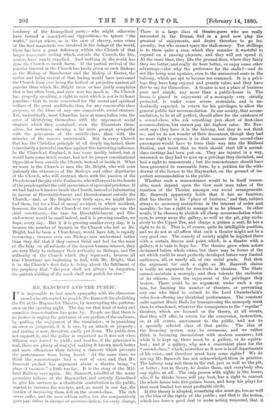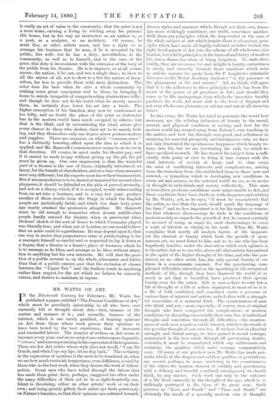MR. BANCROFT AND THE PUBLIC.
IT is impossible to feel much sympathy with the clamorous crowd who attempted to punish Mr. Bancroft for abolishing the Pit at the Haymarket Theatre, by interrupting the perform- ance on the opening night. The day for that kind of noisy and senseless demonstration has gone by. People see that there is no justice in urging the grievance of oue portion of the audience, by spoiling the enjoyment of the remainder ; or in punishing an error of judgment, if it is one, by an attack on property ; and rioting is now, therefore, easily put down. The public does not support it, and the police is organised as it was not when Elliston was forced to yield ; and besides, if the grievance is real, there are plenty of ways:of making it known much better and more efficacious than raising a clamour which prevents the performance from being heard. At the same time, we think the remonstrants had a sort of case, and that Mr. Bancroft pushed his argument about a theatre being "a place of business " a little too far. It is the story of the Mid- land Railway over again. Mr. Bancroft, mindful of the many pecuniary failures at the Haymarket, and entirely disinclined to give his services as a charitable contribution to the public, wanted to increase the receipts, and, as usual in our day, the burden of increasing them fell on the second-class. The rich never suffer, and the poor seldom suffer, but the comparatively poor pay, either iu charges or accommodation, for every change,
There is a large class of theatre-goers who are really interested in the Drama, find in a good new play the greatest of enjoyments, and desire therefore to go fre- quently, but who cannot spare the stall-money. Ten shillings is to them quite a sum, which they consider it wasteful to expend on a passing pleasure, and they will not spend it. At the same time, they like the ground-floor, where they fancy they see better, and really do hear better, or enjoy some other advantage—else why the preference for the stalls ?—and do not like being sent upstairs, even to the unreserved seats in the balcony, which are apt to become too crammed. It is a privi- lege they have long enjoyed and greatly value, and they have this to say for themselves. A theatre is not a place of business pure and simple, any more than a public-house is. The lessee is placed in enjoyment of a monopoly very strictly protected, is under some severe restraints, and is un- doubtedly expected, in return for his privileges, to allow the general public fair accommodation. In our society, that accom- modation, to be at all perfect, should allow for the existence of a second-class, who ask something just short of first-class accommodation, but cannot pay the highest rates. Mr. Ban- croft says they have it in the balcony, but they do not think so ; and we do not wonder at their discontent, though they had no more right to express it in that manner than second-class passengers would have to force their way into the Midland Station, and insist that no train should start till a second- class carriage had been put on. They are injured in a way, inasmuch as they had to give up a privilege they cherished, and had a right to remonstrate ; but the remonstrance should have been presented in reasonable form, by a petition for the with- drawal of the licence to the Haymarket, on the ground of im- perfect accommodation to the public.
Whether such a remonstrance would be in itself reason- able, must depend upon the view each man takes of the function of the Theatre amongst our social arrangements. Mr. Bancroft apparently holds that it has no function, that his theatre is his "place of business," and that, subject always to necessary restrictions in the interest of order and morality, he has a right to manage it as he pleases. In other words, if he chooses to abolish all cheap accommodation what- ever, to sweep away the gallery, as well as the pit, play exclu- sively to the Upper Ten, and charge a guinea a seat, he has a right to do it. That is, of course, quite an intelligible position, and we do not at all affirm that such a theatre might not be a very good one. The comedy of society might be depicted there with a certain finesse and point which, in a theatre with a gallery, it is vain to hope for. The theatre grew when actors declaimed before whole cities, but there may be forms of the art which could be most perfectly developed before very limited audiences, all, or nearly all, of one social grade. But then the argument for such a right as Mr. Bancroft claims is really an argument for free-trade in theatres. The State cannot maintain a monoply, and then tolerate the exclusion of its citizens from the enjoyment of the privileges they bestow. There could be no argument, under such a sys- tem, for limiting the number of theatres, or preventing auy one who liked to submit to the Lord Chamberlain's rules from offering any theatrical performance. The constant suits against Music Halls for transgressing the monopoly must then be abandoned, whatever the consequence to the " regular" theatres, which are licensed on the theory, at all events, that they will offer, in return for the concession, instruction, or, at all events, amusement to the public, and not to a specially selected class of that public. The idea of the licensing system may be erroneous, and we rather think is becoming inconsistent with modern manners ; but while it is kept up, there must be a gallery, or its equiva- lent ; and if a gallery, why not a convenient place for the " second-class," which, powerless as it now is in all departments of life exists, and therefore must have some rights ? We do not say Mr. Bancroft has not acknowledged them in practice. The balcony may suit them in the end, just as well as the pit, or better ; but in theory, he denies them, and everybody else, any rights at all. The only person with rights is the lessee, who, if he thinks boxes will pay best, has a right to convert the whole house into five-guinea boxes, and keep his plays for that most limited but most profitable circle.
If this theory is adopted, something else must go, too, as well as the idea of the rights of the public ; and that is the notion, which has done a good deal to make acting respected, that it is really an art of value to the community, that the actor is not a mere mime, earning a living by whiling away his patrons' idle hours, but in his way an instructor, as an author is, or a poet, or a sculptor, or an architect. Of course, he must live, as other artists must, and has a right so to arrange his business that he may, if he is accepted by the public, live well ; but he has a duty, nevertheless, to the community, as well as to himself, and in the case of the actor, this duty is inconsistent with the extrusion of the body of the public from his theatre. He is to improve, or at all events amuse, the nation, if he can, and not a single class ; to show to all the mirror of all, not to show to a few the mirror of them- selves, far less to provide them with mere distraction. The actor does his best when he stirs a whole community by making some great conception real to them, by bringing it home to minds incapable of comprehending abstractions fully ; and though he does not do his worst when he merely amuses them, he certainly does lower his art into a trade. The higher conception of his function may now be condemned as too lofty, and no doubt the place of the actor as instructor has in the modern world been much occupied by others ; but that is the ideal, and in surrendering the ideal, actors give every chance to those who declare their art to be merely fool- ing, and they themselves only one degree above posture-makers and jugglers. There are occasions on which " common-sense " has a distinctly lowering effect upon the idea to which it is applied, and Mr. Bancroft's common-sense seems to us to err in that direction. Of course, he must make his theatre pay, and if it cannot be made to pay without giving up the pit, the pit must be given up. Our own impression is that the wasteful part of a theatre is the row of boxes, originally introduced, we fancy, for the benefit of shareholders, and at a time when manners were very different; but the experts must know their business best. But if accommodation is to he denied or impaired for second-class playgoers, it should be defended on the plea of proved necessity, and not on a theory which, if it is accepted, would reduce acting from an art into a business, and in a very few years produce another of those recoils from the Stage to which the English people are periodically liable, and which less than forty years ago nearly crushed the profession altogether. Mr. Bancroft must be old enough to remember when decent middle-class people hardly entered the theatre, when in provincial cities Dickens' sketch of the sort of house to which Crummles played was literally true, and when out of London, no one would believe that an actor could be a gentleman. He may depend upon it, that one way to revive that preposterous state of public feeling is for a manager, himself so careful and so respected, to lay it down as a dogma that a theatre is a lessee's place of business, which he is to manage as he likes, and arrange as he likes, without atten- tion to anything but his own interests. He will find the posi- tion of a public servant is, on the whole, pleasanter and loftier than that of a public caterer, and that the exclusion of classes between the " Upper Ten " and the Gallery tends to anything rather than respect for the art which we believe he sincerely values, and desires to maintain in repute.



































 Previous page
Previous page